- Home
- Sarah J. Maas
A Court of Thorns and Roses Page 8
A Court of Thorns and Roses Read online
Page 8
Either live as a beast, or live with the mask. “What—what sort of sickness is it?”
“It’s not a disease—not a plague or illness. It’s focused solely on magic, on those dwelling in Prythian. Andras was across the wall that day because I sent him to search for a cure.”
“Can it hurt humans?” My stomach twisted. “Will it spread over the wall?”
“Yes,” he said. “There is … a chance of it affecting mortals, and your territory. More than that, I don’t know. It’s slow-moving, and your kind is safe for now. We haven’t had any progression in decades—magic seems to have stabilized, even though it’s been weakened.” That he’d even admitted so much spoke volumes about how he imagined my future: I was never going home, never going to encounter another human to whom I might spill this secret vulnerability.
“A mercenary told me she believed faeries might be thinking of attacking. Is it related?”
A hint of a smile, perhaps a bit surprised. “I don’t know. Do you talk to mercenaries often?”
“I talk to whoever bothers to tell me anything useful.”
He straightened, and it was only his promise not to kill me that kept me from cringing. Then he rolled his shoulders, as if shaking off his annoyance. “Was the trip wire you rigged in your room for me?”
I sucked on my teeth. “Can you blame me if it was?”
“I might take an animal form, but I am civilized, Feyre.”
So he did remember my name, at least. But I looked pointedly at his hands, at the razor-sharp tips of those long, curved claws poking through his tanned skin.
Noticing my stare, he tucked his hands behind his back. He said sharply, “I’ll see you at dinner.”
It wasn’t a request, but I still gave him a nod as I strode off between the hedges, not caring where I was going—only that he stayed far behind.
A sickness in their lands, affecting their magic, draining it from them … A magical blight that might one day spread to the human world. After so many centuries without magic, we’d be defenseless against it—against whatever it could do to humans.
I wondered if any of the High Fae would bother warning my kind.
It didn’t take me long to know the answer.
Chapter 8
I pretended to meander through the exquisite and silent gardens, mentally marking the paths and clever places for hiding if I ever needed them. He’d taken my weapons, and I wasn’t stupid enough to hope for an ash tree somewhere on the property with which to make my own. But his baldric had been laden with knives; there had to be an armory somewhere on the estate. And if not, I would find another weapon, then—steal it if I had to. Just in case.
Upon inspection the night before, I’d learned that there was no lock on my window. Sneaking out and rappelling down the wisteria vines wouldn’t be difficult at all—I’d climbed enough trees to not mind the height. Not that I planned to escape, but … it was good to know, at least, how I might do so should I ever be desperate enough to risk it.
I didn’t doubt Tamlin’s claim that the rest of Prythian was deadly for a human—and if there was indeed some blight on these lands … I was better off here for the time being.
But not without trying to find someone who might plead my case to Tamlin.
Though Lucien—he could do with someone snapping at him, if you’ve the courage for it, Alis had said to me yesterday.
I chewed on my stubby nails as I walked, considering every possible plan and pitfall. I’d never been particularly good with words, had never learned the social warfare my sisters and mother had been so adept at, but … I’d been decent enough when selling hides at the village market.
So perhaps I’d seek out Tamlin’s emissary, even if he detested me. He clearly had little interest in my living here—he’d suggested killing me. Perhaps he’d be eager to send me back, to persuade Tamlin to find some other way to fulfill the Treaty. If there even was one.
I approached a bench in an alcove blooming with foxglove when the sound of steps on shifting gravel filled the air. Two pairs of light, quick feet. I straightened, peering down the way I’d come, but the path was empty.
I lingered at the edge of an open field of lanky meadow buttercups. The vibrant green-and-yellow field was deserted. Behind me arose a gnarled crab apple tree in full, glorious bloom, the petals of its flowers littering the shaded bench on which I’d been about to sit. A breeze set the branches rustling, a waterfall of white petals flittering down like snow.
I scanned the garden, the field—carefully, carefully watching and listening for those two sets of feet.
There was nothing in the tree, or behind it.
A prickling sensation ran down my spine. I’d spent enough time in the woods to trust my instincts.
Someone stood behind me—perhaps two of them. A faint sniff and a quiet giggle issued from far too close. My heart leaped into my throat.
I cast a subtle glance over my shoulder. But only a shining silvery light flickered in the corner of my vision.
I had to turn around. I had to face it.
The gravel crunched, nearer now. The shimmering in the corner of my eye grew larger, separating into two small figures no taller than my waist. My hands clenched into fists.
“Feyre!” Alis’s voice cut across the garden. I jumped out of my skin as she called me again. “Feyre, lunch!” she hollered. I whirled, a shout forming on my lips to alert her to whatever stood behind me, raising my fists, however futile it would be.
But the shining things had vanished, along with their sniffing and giggling, and I found myself facing a weathered statue of two merry, bounding lambs. I rubbed my neck.
Alis called me again, and I took a shuddering breath as I returned to the manor. But even as I strode through the hedges, carefully retracing my steps back to the house, I couldn’t erase the creeping feeling that someone still watched me, curious and wanting to play.
I stole a knife from dinner that night. Just to have something—anything—to defend myself with.
It turned out that dinner was the only meal I was invited to attend, which was fine. Three meals a day with Tamlin and Lucien would have been torturous. I could endure an hour of sitting at their fancy table if it made them think I was docile and had no plans to change my fate.
While Lucien ranted to Tamlin about some malfunction of the magical, carved eye that indeed allowed him to see, I slipped my knife down the sleeve of my tunic. My heart beat so fast I thought they could hear it, but Lucien continued speaking, and Tamlin’s focus remained on his courtier.
I supposed I should have pitied them for the masks they were forced to wear, for the blight that had infected their magic and people. But the less I interacted with them the better, especially when Lucien seemed to find everything I said to be hilariously human and uneducated. Snapping at him wouldn’t help my plans. It would be an uphill battle to win his favor, if only for the fact that I was alive and his friend was not. I’d have to deal with him alone, or risk raising Tamlin’s suspicions too soon.
Lucien’s red hair shone in the firelight, the colors flickering with every movement he made, and the jewels in the hilt of his sword glinted—the ornate blade so unlike the baldric of knives still strapped across Tamlin’s chest. But there was no one here to use a sword against. And while the sword was embedded with jewels and filigree, it was large enough to be more than decoration. Perhaps it had something to do with those invisible things in the garden. Maybe he’d lost his eye and earned that scar in battle. I fought against a shudder.
Alis had said the house was safe, but warned me to keep my wits about me. What might lurk beyond the house—or be able to use my human senses against me? Just how far would Tamlin’s order not to harm me stretch? What kind of authority did he hold?
Lucien paused, and I found him smirking at me, making the scar even more brutal. “Were you admiring my sword, or just contemplating killing me, Feyre?”
“Of course not,” I said softly, and glanced at Tamlin. The
gold flecks in his eyes glowed, even from the other end of the table. My heart beat at a gallop. Had he somehow heard me take the knife, the whisper of metal on wood? I forced myself to look again at Lucien.
His lazy, vicious grin was still there. Act civilized, behave, possibly win him to my side … I could do that.
Tamlin broke the silence. “Feyre likes to hunt.”
“I don’t like to hunt.” I should have probably used a more polite tone, but I went on. “I hunted out of necessity. And how did you know that?”
Tamlin’s stare was bald, assessing. “Why else were you in the woods that day? You had a bow and arrows in your … house.” I wondered whether he’d almost said hovel. “When I saw your father’s hands, I knew he wasn’t the one using them.” He gestured to my scarred, callused hands. “You told him about the rations and money from pelts. Faeries might be many things, but we’re not stupid. Unless your ridiculous legends claim that about us, too.”
Ridiculous, insignificant.
I stared at the crumbs of bread and swirls of remaining sauce on my golden plate. Had I been at home, I would have licked my plate clean, desperate for any extra bit of nourishment. And the plates … I could have bought a team of horses, a plow, and a field for just one of them. Disgusting.
Lucien cleared his throat. “How old are you, anyway?”
“Nineteen.” Pleasant, civilized …
Lucien tsked. “So young, and so grave. And a skilled killer already.”
I tightened my hands into fists, the metal of the knife now warm against my skin. Docile, unthreatening, tame … I’d made my mother a promise, and I’d keep it. Tamlin’s looking after my family wasn’t the same as my looking after them. That wild, small dream could still come to pass: my sisters comfortably married off, and a lifetime with my father, with enough food for us both and enough time to maybe paint a little—or to maybe learn what I wanted. It could still happen—in a faraway land, perhaps—if I ever got out of this bargain. I could still cling to that scrap of a dream, though these High Fae would likely laugh at how typically human it was to think so small, to want so little.
Yet any bit of information might help, and if I showed interest in them, perhaps they would warm to me. What was this but another trap in the woods? So I said, “So is this what you do with your lives? Spare humans from the Treaty and have fine meals?” I gave a pointed glance toward Tamlin’s baldric, the warrior’s clothes, Lucien’s sword.
Lucien smirked. “We also dance with the spirits under the full moon and snatch human babes from their cradles to replace them with changelings—”
“Didn’t …,” Tamlin interrupted, his deep voice surprisingly gentle, “didn’t your mother tell you anything about us?”
I prodded the table with my forefinger, digging my short nails into the wood. “My mother didn’t have the time to tell me stories.” I could reveal that part of my past, at least.
Lucien, for once, didn’t laugh. After a rather stilted pause, Tamlin asked, “How did she die?” When I lifted my brows, he added a bit more softly, “I didn’t see signs of an older woman in your house.”
Predator or not, I didn’t need his pity. But I said, “Typhus. When I was eight.” I rose from my seat to leave.
“Feyre,” Tamlin said, and I half turned. A muscle feathered in his cheek.
Lucien glanced between us, that metal eye roving, but kept silent. Then Tamlin shook his head, the movement more animal than anything, and murmured, “I’m sorry for your loss.”
I tried to keep from grimacing as I turned on my heel and left. I didn’t want or need his condolences—not for my mother, not when I hadn’t missed her in years. Let Tamlin dismiss me as a rude, uncouth human not worth his careful watch.
I’d be better off persuading Lucien to speak to Tamlin on my behalf—and soon, before any of the others whom they’d mentioned appeared, or this blight of theirs grew. Tomorrow—I’d speak to Lucien then, test him out a bit.
In my room, I found a small satchel in the armoire and filled it with a spare set of clothes, along with my stolen knife. It was a pitiful blade, but a piece of cutlery was better than nothing. Just in case I was ever allowed to go—and had to leave at a moment’s notice.
Just in case.
Chapter 9
The following morning, as Alis and the other servant woman prepared my bath, I contemplated my plan. Tamlin had mentioned that he and Lucien had various duties, and aside from running into him in the house yesterday, I’d seen neither of them around. So, locating Lucien—alone—would be the first order of business.
A casual question tossed in Alis’s direction had her revealing that she believed Lucien was on border patrol today—and would be at the stables, preparing to leave.
I was halfway through the gardens, hurrying toward the outcropping of buildings I’d spied the day before, when Tamlin said from behind me, “No trip wires today?”
I froze midstep and looked over my shoulder. He was standing a few feet away.
How had he crept up so silently on the gravel? Faerie stealth, no doubt. I willed calm into my veins, my head. I said as politely as I could, “You said I was safe here. So I listened.”
His eyes narrowed slightly, but he put on what I supposed was his attempt at a pleasant smile. “My morning work was postponed,” he said. Indeed, his usual tunic was off, the baldric gone, and the sleeves of his white shirt had been rolled up to the elbows to reveal tanned forearms corded with muscle. “If you want a ride across the grounds—if you’re interested in your new … residence, I can take you.”
Again, that effort to be accommodating, even when every word seemed to pain him. Maybe he could eventually be swayed by Lucien. And until then … how much could I get away with, if he was going to such lengths to make his people swear not to harm me, to shield me from the Treaty? I smiled blandly and said, “I’d prefer to spend today alone, I think. But thank you for the offer.”
He tensed. “What about—”
“No, thank you,” I interrupted, marveling a bit at my own audacity. But I had to catch Lucien alone, had to feel him out. He might already be gone.
Tamlin clenched his hands into fists, as if fighting against the claws itching to burst out. But he didn’t reprimand me, didn’t do anything other than prowl back into the house without another word.
Soon enough, if I was lucky, Tamlin wouldn’t be my problem anymore. I hurried for the stables, tucking away the information. Maybe one day, if I was ever released, if there was an ocean and years between us, I would think back and wonder why he’d bothered.
I tried not to look too eager, too out of breath when I finally reached the pretty, painted stables. It didn’t surprise me that the stableboys all wore horse masks. For them I felt a shred of pity at what the blight had done, the ridiculous masks they now had to wear until someone could figure out how to undo the magic binding them to their faces. But none of the stable hands even looked at me—either because I wasn’t worth it or because they, too, resented me for the death of Andras. I didn’t blame them.
Any attempt at casualness took a stumble when I finally found Lucien astride a black gelding, grinning down at me with too-white teeth.
“Morning, Feyre.” I tried to hide the stiffening in my shoulders, tried to smile a bit. “Going for a ride, or merely reconsidering Tam’s offer to live with us?” I tried to recall the words I’d come up with earlier, the words to win him, but he laughed—and not pleasantly. “Come now. I’m to patrol the southern woods today, and I’m curious about the … abilities you used to bring down my friend, whether accidental or not. It’s been a while since I encountered a human, let alone a Fae-killer. Indulge me in a hunt.”
Perfect—at least that part of this had gone well, even if it sounded as lovely as facing a bear in its den. So I stepped aside to let a stableboy pass. He moved with a fluid smoothness, like all of them here. And didn’t look at me, either—no indication at all of what he thought of having a Fae-killer in his stable.
&
nbsp; But my kind of hunting couldn’t be done on horseback. Mine consisted of careful stalking and well-laid traps and snares. I didn’t know how to give chase atop a horse. Lucien accepted a quiver of arrows from the returning stableboy with a nod of thanks. Lucien smiled in a way that didn’t meet that metal eye—or the russet one. “No ash arrows today, unfortunately.”
I clenched my jaw to keep a retort from slipping off my tongue. If he was forbidden from hurting me, I couldn’t fathom why he would invite me along, save to mock me in whatever way he could. Perhaps he was truly that bored. Better for me.
So I shrugged, looking as bored as I could. “Well … I suppose I’m already dressed for a hunt.”
“Perfect,” Lucien said, his metal eye gleaming in the sunlight slanting in through the open stable doors. I prayed Tamlin wouldn’t come prowling through them—prayed he wouldn’t decide to go for a ride on his own and catch us here.
“Let’s go, then,” I said, and Lucien motioned for them to prepare a horse. I leaned against a wooden wall as I waited, keeping an eye on the doorway for signs of Tamlin, and offered my own bland replies to Lucien’s remarks about the weather.
Mercifully, I was soon astride a white mare, riding with Lucien through the spring-shrouded woods beyond the gardens. I kept a healthy distance from the fox-masked faerie on the broad path, hoping that eye of his couldn’t see through the back of his head.
The thought didn’t sit well, and I shoved it away—along with the part of me that marveled at the way the sun illuminated the leaves, and the clusters of crocuses that grew like flashes of vibrant purple against the brown and green. Those were things that weren’t necessary to my plans, useless details that only blocked out everything else: the shape and slope of the path, what trees were good for climbing, sounds of nearby water sources. Those things could help me survive if I ever needed to. But, like the rest of the grounds, the forest was utterly empty. No sign of faeries, nor any High Fae wandering around. Just as well.
“Well, you certainly have the quiet part of hunting down,” Lucien said, falling back to ride beside me. Good—let him come to me, rather than me seeming too eager, too friendly.

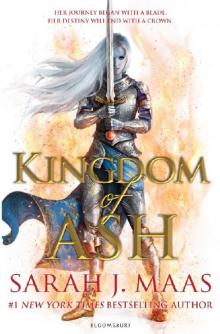 Kingdom of Ash
Kingdom of Ash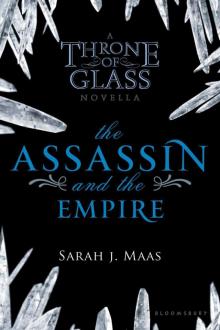 The Assassin and the Empire
The Assassin and the Empire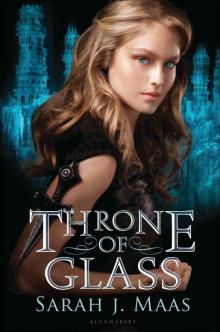 Throne of Glass
Throne of Glass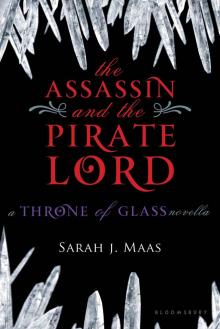 The Assassin and the Pirate Lord
The Assassin and the Pirate Lord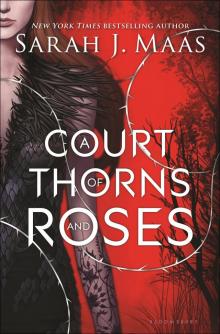 A Court of Thorns and Roses
A Court of Thorns and Roses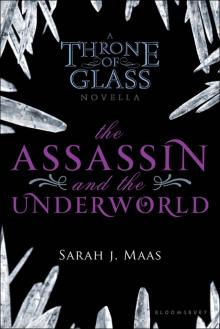 The Assassin and the Underworld
The Assassin and the Underworld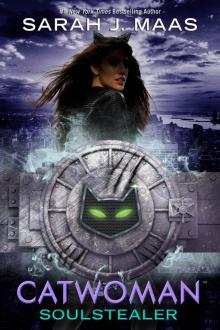 Catwoman: Soulstealer
Catwoman: Soulstealer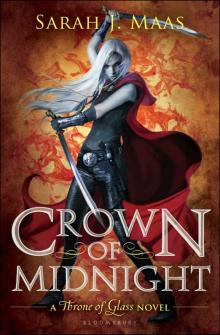 Crown of Midnight
Crown of Midnight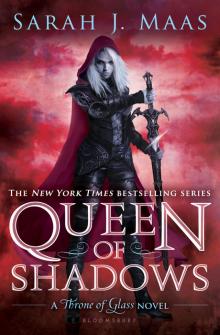 Queen of Shadows
Queen of Shadows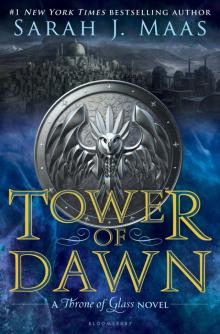 Tower of Dawn
Tower of Dawn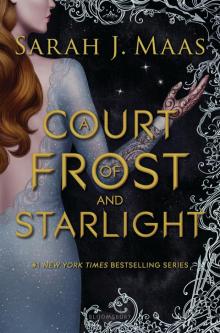 A Court of Frost and Starlight
A Court of Frost and Starlight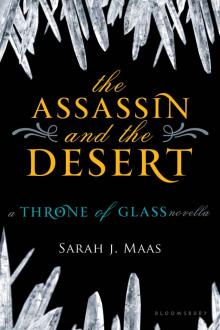 The Assassin and the Desert
The Assassin and the Desert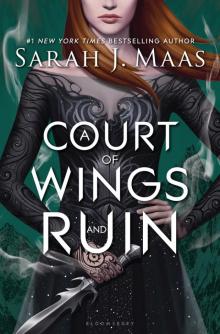 A Court of Wings and Ruin
A Court of Wings and Ruin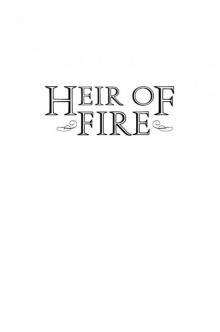 Heir of Fire
Heir of Fire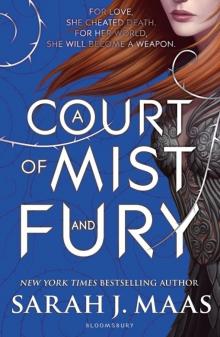 A Court of Mist and Fury
A Court of Mist and Fury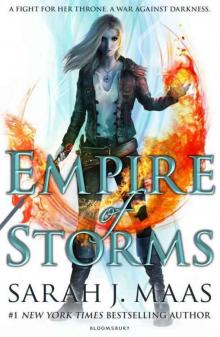 Empire of Storms
Empire of Storms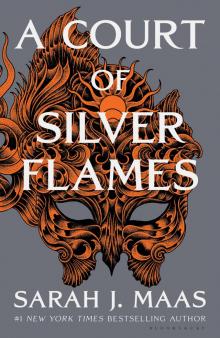 A Court of Silver Flames
A Court of Silver Flames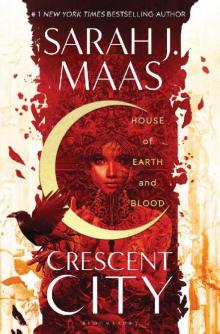 House of Earth and Blood (Crescent City)
House of Earth and Blood (Crescent City)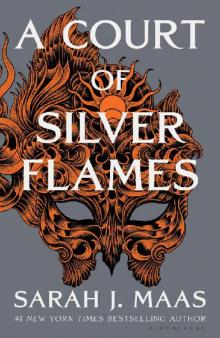 A Court of Silver Flames (A Court of Thorns and Roses)
A Court of Silver Flames (A Court of Thorns and Roses)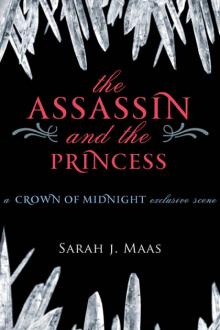 The Assassin and the Princess
The Assassin and the Princess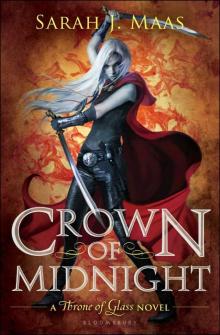 Crown of Midnight_Throne of Glass
Crown of Midnight_Throne of Glass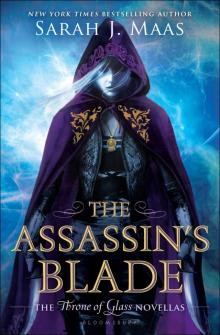 The Assassin's Blade
The Assassin's Blade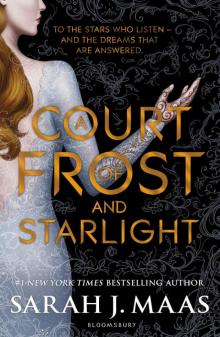 A Court of Frost and Starlight_A Court of Thorns and Roses
A Court of Frost and Starlight_A Court of Thorns and Roses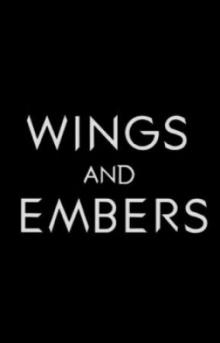 Wings and Embers
Wings and Embers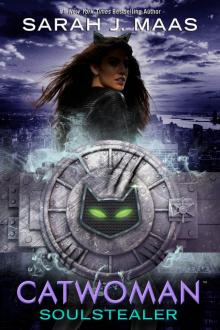 Catwoman
Catwoman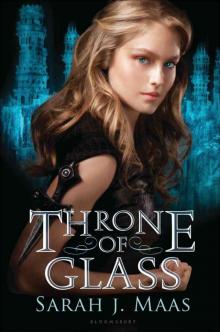 Throne of Glass tog-1
Throne of Glass tog-1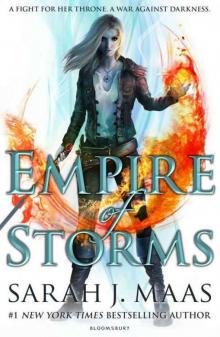 Empire of Storms (Throne of Glass)
Empire of Storms (Throne of Glass)